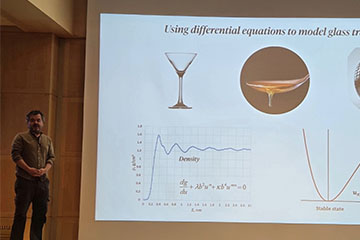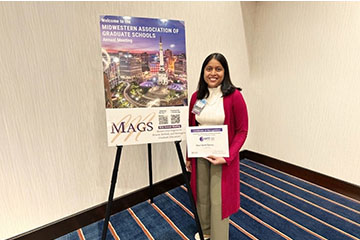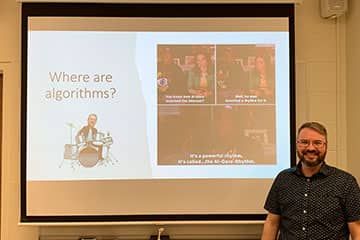Crossing borders, bridging gaps
Canadian grad student’s research leadership brings new focus to the hijab on college campuses
No one needed to tell Central Michigan University graduate student Hanan Emhammed that wearing the hijab comes with its challenges. She lives that reality.
But researching the experiences of other Muslim women for her CMU master's degree capstone project brought deeper understanding and broke new ground in Canada, where she lives.
Emhammed earned her Master of Arts degree in education with a community college concentration in summer 2020, taking CMU Global Campus classes at Mohawk College in Hamilton, Ontario. It's part of the educational journey she began in her native Libya, where she completed her undergraduate degree in mathematics before moving to Canada 21 years ago. She plans to pursue a doctoral degree and a career focused on access and equity in community colleges.
Her research explores how wearing the hijab impacts Muslim women in colleges and how Islamophobia affects campuses in Ontario. It earned her the 2021 CMU/Ontario College Administrative Staff Association Outstanding Research Award.
Emhammed focused on intersectionality — how factors like religion, gender, race and socioeconomic status all overlap to affect a person's experience and provoke hostility from others.
"I found there was a breadth of literature that explored this in the U.S., Britain and Europe," she said. "It wasn't easy to find in Canada."
So Emhammed polled and sampled and sought out interview subjects for her research: women age 18-25 enrolled in postsecondary education who wear the hijab.
All reported experiencing animosity and feeling ostracized in classrooms. They knew they were always under scrutiny and sometimes even seen as perpetuating gender inequality for wearing the hijab. And yet, the hijab also bonded them in a kind of sisterhood.
"They told me that it was a way to cope and exist with this stigma," Emhammed said. "They looked for others who wore the hijab."
The support they shared helped them cope with hostility.
One of her research subjects, a convert to Islam, was punched, shoved and name-called by another woman in Toronto. The subject told Emhammed that sometimes when she's out in society she wishes she could crawl into a hole and hide.
"I was surprised that wearing the hijab could affect women to where they were afraid for their lives," Emhammed said.
Leading in Canada
CMU has developed leaders within the Ontario college system for nearly 45 years through its Master of Arts degree in education with a community college concentration, or MAE-CC. Eight-week terms are taught face to face at select Ontario colleges, and online in the U.S. and Canada. Areas of emphasis are:
- Administration and student affairs.
- College teaching.
- Training and development.
"Graduates of the MAE-CC program have become college professors, college and university presidents, student affairs professionals, senior administrators and more," said Kaleb Patrick, MAE-CC program director and Educational Leadership faculty member. "This degree prepares students to impact, influence and advance community colleges and postsecondary educational systems for the 21st century."
Finding support at CMU
While her courses prepared her to tackle this type of scientific study, Emhammed said closeness with her instructors — even though she's never been to the United States, let alone to Mount Pleasant — kept her on track to her degree.
As a busy mother whose children include two with special needs and employed as a part-time Arabic instructor at her mosque, she knew it wouldn't be easy to balance life, work and her educational goals. A woman she met at a seminar told her about CMU's program of Friday-Saturday classes hosted at Mohawk College.
She applied because of the flexible schedule but graduated because of the encouragement she received, starting with Educational Leadership faculty members Kaleb Patrick, Gavin Moodie and capstone mentor Scott Roberts.
"Their tremendous help and support eased most of the stress I was under," she said.
"CMU has been supportive in so many ways," she said. "It's the instructors, the administration — getting instant answers to questions, saving 15% on tuition (an adjustment for the Canada-U.S. currency exchange rate). I cannot put it all on one factor. It was so many.
"I was exposed to so much information from my professors and the literature and extensive writing."
The cohort of eight or nine other students going through the program with Emhammed also gave her a boost.
"Discussions in class kept me motivated," she said. "We got to know each other. The classroom leader brought food and sweets. It was always fun."
And in moments when it wasn't fun — such as when Emhammed fell behind schedule from the rest of her cohort, who graduated in 2019 — her patient and understanding instructors wouldn't let her give up.
"They had that gentle support that kept me going," she said.
Personal connections
Emhammed said her capstone project means a lot to her personally because she wears the hijab and wonders what her own daughters may experience in life if they do, too. She's proud that her leadership in researching the issue filled a gap in Canadian literature.
"Learning about the prevalence of hate crimes toward Muslim women got me motivated to do more, hopefully to make a change and raise awareness," she said.
The biggest barrier to understanding that she sees is a lack of person-to-person communication over what the hijab and Muslim identity mean. Her advice: Break the silence.
"I would recommend that people ask questions. Listen to the other side," she said. "Ask these women in your life."




